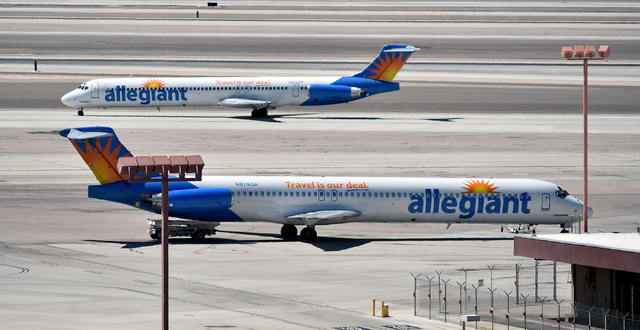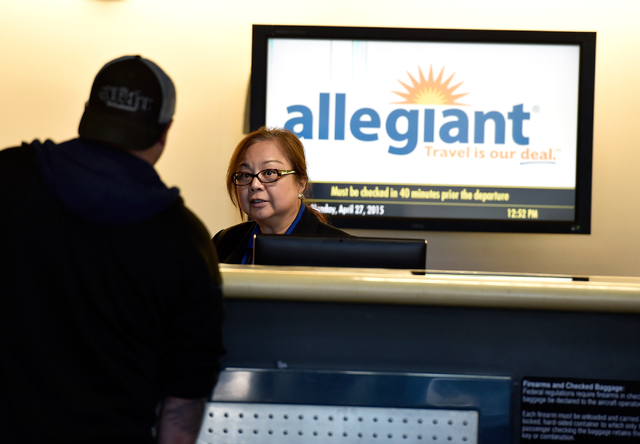U.S. District judge issues ruling to block Allegiant Air pilot strike
The megafight is over, and the loser is already seeking a rematch.
With all eyes in Las Vegas focused on the Manny Pacquiao-Floyd Mayweather Jr. boxing match, U.S. District Judge Andrew Gordon quietly released a decision late Friday issuing a preliminary injunction that blocks Allegiant Air pilots from striking, much to the relief of thousands of ticketed passengers who have anxiously awaited a decision since April 16.
The Airline Professionals Association Teamsters Local 1224 immediately said it would seek an expedited appeal of the ruling.
“Allegiant Air has been successful in receiving a court order blocking the Teamsters from striking and safeguarding Allegiant’s passengers from travel disruptions,” a statement issued by the company Saturday morning said.
“With the threat of a strike lifted, Allegiant looks forward to directing its time and energy back to the negotiating table to work on securing a contract that will be beneficial to both its pilots and the company,” the release said.
But a union spokesman said the Teamsters believe the ruling is flawed and will be appealed.
“Rather than investing in its workforce and operation, the country’s most profitable airline chooses to reduce previously negotiated and agreed-upon work rules and benefits for pilots who are simply trying to serve our customers and support our families,” said First Officer Cameron Graff, one of the union’s witnesses in the three-day hearing in Allegiant’s bid for an injunction against the Teamsters.
“In his decision, the judge held that Allegiant’s implementation of a new scheduling system was a violation of the status quo as set forth by the pilot work rules,” he said in a statement issued Saturday morning before Allegiant’s announcement.
“We believe our strike to restore the status quo is legal and that the court’s injunction in this case is not in accordance with federal law. We are therefore moving forward to file an expedited appeal to protect our rights and those of pilots at every airline in the country. For our airlines to run safely and efficiently, pilots must have a voice.
“Rather than spend all this time in court, pilots are calling on Allegiant to fully restore our contract so we can focus on our work, sit down to negotiate a future contract and work together to secure the future prosperity of Allegiant and the Allegiant pilots,” he said.
The union and company met for two days in mediated contract talks in Washington last week.
While neither side has indicated whether any progress has been made in negotiations, an Allegiant spokeswoman said the company is looking forward “to returning to the table again for our next session during the week of May 18.”
Union officials have said they would seek a release from mediation if no progress is made. If the mediator has determined that an impasse has occurred and releases the union, it would start the clock on a 30-day cooling-off period after which the pilots could strike.
In the meantime, Gordon’s ruling clearly blocks the pilots from walking off the job.
The judge’s order said the pilots “are hereby enjoined from in any manner or by any means directing, calling, causing, authorizing, inducing, instigating, conducting, continuing, encouraging or engaging in any strike, work stoppage, picketing, sickout, slow-down, work-to-rule campaign or other concerted action that is intended to interfere with Allegiant’s normal operations in violation of the Railway Labor Act.”
The ruling further orders that “their officers, agents, employees, and members, and all persons acting in concert or participation with them, shall immediately take all reasonable steps within their power to prevent the aforesaid actions and to refrain from continuing the aforesaid actions, if commenced.”
In his 11-page ruling, Gordon analyzed point by point his conclusions on four factors leading to the decision. In all four, the judge said the arguments favored Allegiant’s point of view.
The union’s case was built around whether Allegiant violated status quo work rules ordered by Gordon in July. Most of the union’s argument centered around a change in the pilot scheduling system. The judge determined that while the change frustrated pilots, it didn’t constitute a violation of status quo work rules.
“... The pilots expressed understandable frustration with the new scheduling system, particularly given that, in their view, Allegiant misrepresented the need for it in the prior hearing that led to my July order. But as I explained many times during this more recent hearing, the issue presently before me is solely whether Allegiant violated the status quo established by my July order. When pressed, Teamsters struggled to identify specific violations. Nor could Teamsters identify what would have to happen for me to find that status quo had been reinstated.”
“I understand that the pilots are unhappy with the new scheduling system. But based on the evidence presented at the evidentiary hearing, I cannot find that Allegiant has, since July, violated the status quo established by my order,” the judge’s order said.
The ruling also explained that a strike would cause irreparable harm to Allegiant, with a shutdown costing the airline an estimated $7.7 million per day. That’s because there are few options for ticketed passengers to be accommodated by other airlines because Allegiant flies to small cities not served by other carriers.
Gordon said the damage of a strike is significant to the airline and the public but negligible to the pilots.
“If the pilots are allowed to strike, Allegiant would potentially lose millions of dollars and would have a hard time recovering from the blow to its reputation that a large number of canceled flights would cause,” the ruling said.
“Given the disruption to the public that an airline strike can cause (especially where Allegiant may be the only airline servicing many of its markets), granting Allegiant an injunction would not injure any critical public interest. Rather, an injunction would further the public interest by insuring that air travel on a major carrier could continue,” he said.
Thousands of Allegiant customers nationwide have been clamoring for information about a potential strike since the Teamsters first announced April 1 their plans to walk off the job at midnight that evening.
Allegiant’s flight network includes not only its Las Vegas headquarters but also resort destinations in Arizona, Florida and Hawaii. The company specializes in flying passengers to resort destinations from small cities across the country, using a model of low base fares coupled with an extensive menu of optional service fees, including charges for baggage, carry-on luggage, seat selection and printing a boarding pass at the airport.
The pilots are one of three work groups represented by unions at Allegiant. But last week, the small dispatchers group voted to decertify a separate Teamsters local that represented it. Because the vote ended in a tie, the National Mediation Board solicited legal briefs from both sides to consider either certifying the results or ordering a runoff election since there were three parties on the ballot. In the vote, the Teamsters and “no representation” received seven votes and longtime Allegiant dispatcher Ronald D. Doig, who initially sought the decertification vote, received no votes.
The airline’s flight attendants, represented by Transport Workers Union Local 577, still are in negotiations for their first contract with the airline after voting to be represented by the union in 2010. Flight attendants have indicated they would support the pilots if they walked off the job.
Allegiant Chairman and CEO Maurice Gallagher has made several statements over the years indicating his opposition to union representation of work groups.
Contact Richard N. Velotta at rvelotta@reviewjournal.com or 702-477-3893. Find him on Twitter: @RickVelotta
Related Stories:
Labor-management tensions still present at Allegiant
Judge to rule ‘expeditiously’ in Allegiant Air-pilots dispute
Federal judge blocks strike by Allegiant pilots
Allegiant Air’s pilots union says airline is scraping by on safety





















